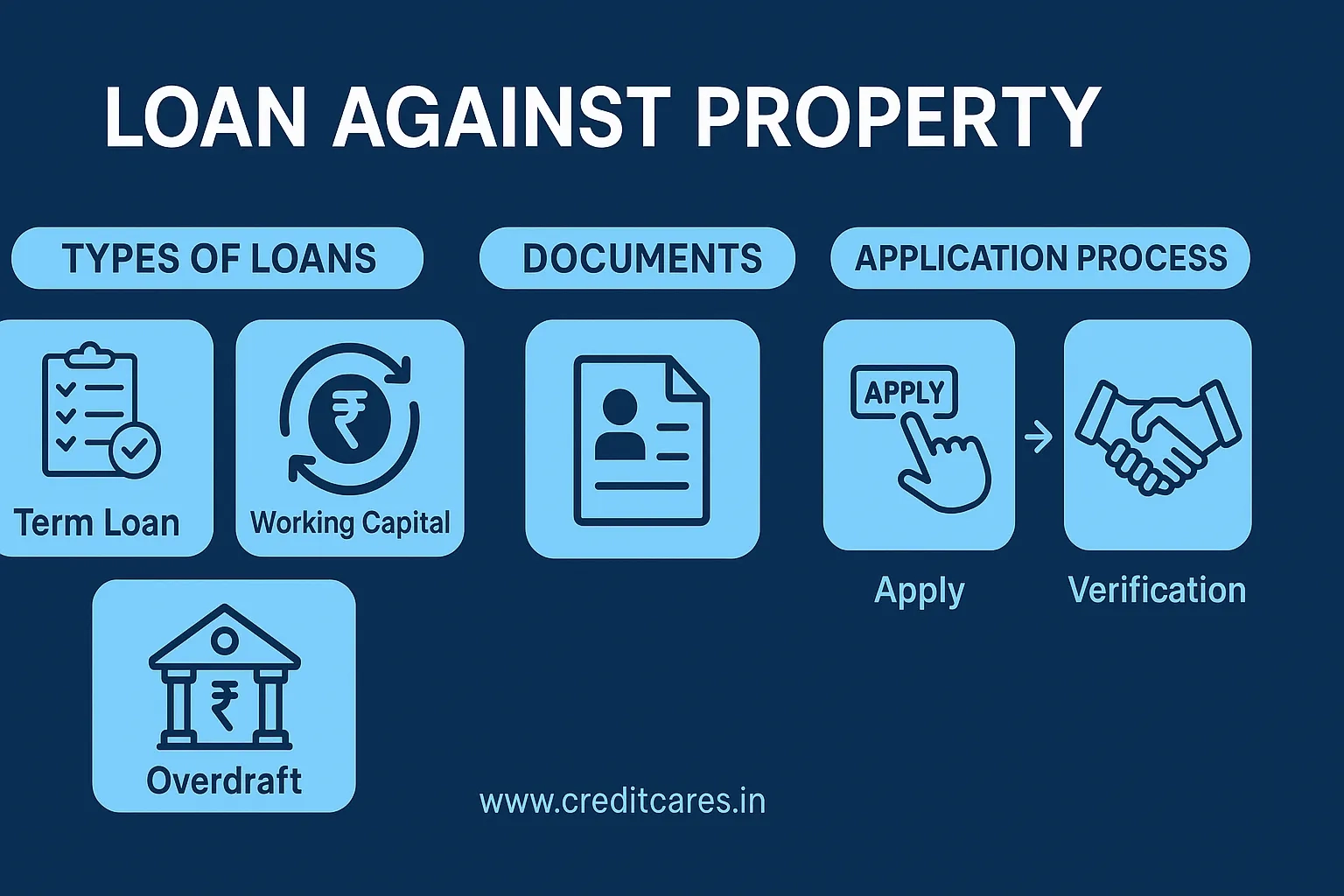Loan Against Property is a powerful financial tool for Indian business owners looking to leverage their real estate assets for capital. Whether you want to expand your business, invest, or meet urgent financial needs, understanding the meaning, types, and application process of this loan can help you make informed decisions.
What is a Loan Against Property?
A Loan Against Property (LAP) is a secured loan where a borrower pledges their residential or commercial property as collateral to avail a loan from banks or financial institutions. This loan amount depends on the market value of the property, your repayment capacity, and the lender’s policies.
The primary advantage is that it offers higher loan amounts and lower interest rates compared to unsecured loans, as the risk to the lender is reduced by the collateral.
For business owners, a LAP is an attractive option to access funds without selling their property or diluting ownership.
Learn more about secured loans from RBI’s official guide.
7 Key Types of Loan Against Property
Understanding the types of LAP available helps you select the best fit for your financial needs:
1. Residential Loan Against Property
This involves pledging your residential home as collateral. It’s suitable for personal or business funding, with tenure typically ranging from 5 to 15 years.
2. Commercial Loan Against Property
In this, commercial buildings like offices, shops, or warehouses are mortgaged. Since commercial properties have higher market values, you can often avail larger loan amounts.
3. Loan Against Leasehold Property
If your property is leasehold (leased from a government or private entity), you can still use it to get a LAP, but lenders usually charge higher interest rates due to the limited ownership tenure.
4. Loan Against Self-Occupied Property
Self-occupied properties used as collateral generally fetch a slightly lower loan amount, as lenders perceive higher risk of non-repayment.
5. Loan Against Rented Property
Rented properties offer steady rental income, improving your repayment capacity. This can increase the loan amount sanctioned.
6. Loan Against Agricultural Property
Some lenders offer LAP against agricultural land, though it’s less common due to the fluctuating land values and regulatory restrictions.
7. Loan Against Under-Construction Property
A few banks allow LAP against properties still under construction, but this comes with stricter eligibility and higher interest rates.
For detailed insights, visit Investopedia’s LAP overview.
How to Apply for Loan Against Property
Applying for a LAP involves several steps designed to verify your eligibility and property value.
Step 1: Check Your Eligibility
Most banks and NBFCs have these criteria:
-
Age: Usually between 21-65 years
-
Stable income or business history
-
Property documents in your name
-
Good credit score (CIBIL score above 750 preferred)
You can check your eligibility online via lender websites or financial portals.
Step 2: Document Preparation
Prepare these essential documents to speed up the process:
-
Identity proof (Aadhaar, PAN card, Passport)
-
Address proof (utility bills, passport)
-
Income proof (salary slips, IT returns, bank statements)
-
Property documents (sale deed, property tax receipts)
-
No Objection Certificate (NOC) from the housing society or builder, if applicable
Step 3: Property Valuation
Lenders appoint valuers to assess the market value of your property. This determines your loan amount. Usually, 40-70% of the property value is sanctioned as loan.
Step 4: Application & Processing
Fill out the loan application form and submit all documents. The lender will perform:
-
Credit appraisal
-
Legal verification of property
-
Technical evaluation (property condition)
Step 5: Loan Approval and Disbursement
Upon successful verification, the lender approves your loan and disburses funds either as a lump sum or in installments.
For a step-by-step guide, see CIBIL’s LAP application process.
Advantages of Loan Against Property
-
Higher loan amounts compared to unsecured loans
-
Lower interest rates due to secured nature
-
Flexible repayment tenure (up to 15 years)
-
Funds can be used for diverse needs (business expansion, education, medical, etc.)
-
No need to sell your property
Important Considerations Before Applying
-
Evaluate your repayment capacity realistically to avoid defaults.
-
Check hidden charges like processing fees, legal fees, and prepayment penalties.
-
Compare interest rates and tenure options from multiple lenders.
-
Ensure all property documents are clear of disputes or legal issues.
FAQs on Loan Against Property
1. What is the maximum loan amount I can get against my property?
The loan amount depends on the lender and the property’s market value but typically ranges between 40-70% of the property’s value.
2. Can I apply for a loan against rented property?
Yes, lenders accept rented properties as collateral, often considering rental income to enhance your eligibility.
3. What is the interest rate on loan against property?
Interest rates vary from 8% to 14% annually, depending on the lender and borrower profile.
4. How long does it take to get a loan against property approved?
Approval generally takes 7-15 working days, depending on document completeness and property verification.
5. Can I prepay my loan against property without penalties?
Some lenders allow prepayment or part-prepayment without charges after a lock-in period; check your lender’s terms carefully.
6. Is CIBIL score important for loan approval?
Yes, a good credit score (above 750) increases chances of approval and better interest rates.
Internal Linking Suggestions
For more financial tips, visit our blogs on Loan Against Property Eligibility and How to Calculate Loan Against Property EMI.
Conclusion and CTA
A Loan Against Property is a versatile financing option for Indian business owners seeking substantial funds at competitive interest rates. Understanding the types and application process helps you leverage your property wisely.
Check your eligibility today and get expert assistance tailored for your needs. For personalized advice, contact us at



